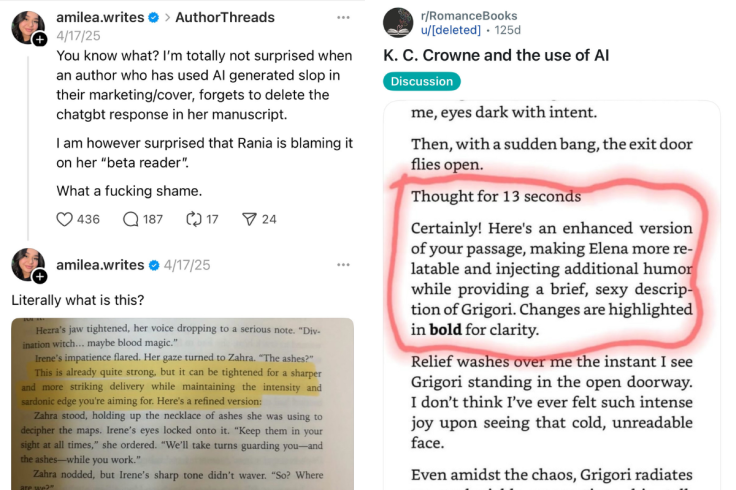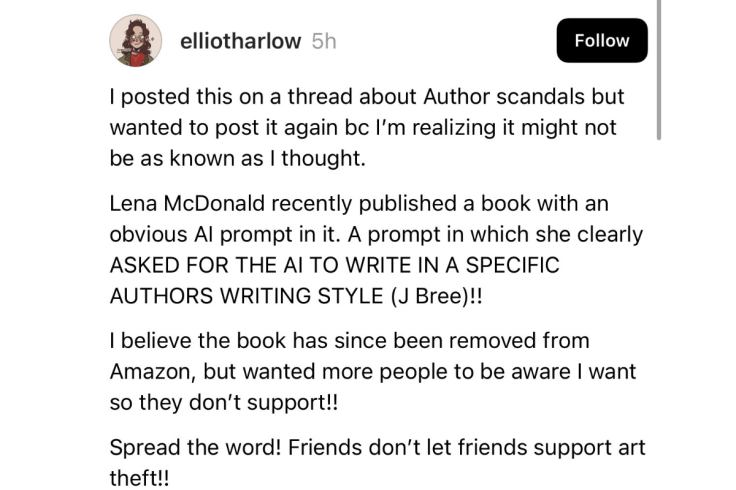AI Prompts Left in Print? Three Fantasy Romance Authors Face Backlash Over Alleged ChatGPT Use
Unedited AI prompts in published novels spark debate over trust, transparency, and authorship in the age of self-publishing.

In late May 2025, fantasy romance authors K.C. Crowne, Rania Faris, and Lena McDonald found themselves at the centre of a growing controversy after readers discovered what appeared to be AI-generated prompts in their newly released novels. The excerpts, which quickly spread across Reddit, Goodreads, and Bluesky, included revision notes and editorial-style cues that strongly suggested the use of tools like ChatGPT during the writing process.
What made this incident stand out wasn't just the presence of AI, now a common behind-the-scenes tool for many writers, but the fact that unedited AI-generated prompts were allegedly left in the finished, published books. For readers expecting polished, immersive fantasy, stumbling across placeholder text or mid-draft instructions felt jarring and even deceptive.
How Readers Caught the Mistakes
It was readers who first flagged the strange language, particularly in McDonald's Darkhollow Academy, where one passage explicitly referenced rewriting a scene to imitate another author's style. The sentence read more like a rough draft note than part of a completed narrative. One user remarked: 'It's like she copied and pasted directly from her AI draft and forgot to clean it up.'
Soon after, screenshots from books by Crowne and Faris surfaced, showing similarly odd or out-of-place lines. While the wording varied, the pattern was consistent: AI-generated content, or at least AI-assisted phrasing, had made it into the final text. Some authors responded quickly, acknowledging the use of AI for brainstorming or light editing, but insisted the included prompts were accidental.

A Divided Reader Response
The reaction from the book world was swift and polarised. Some saw the AI use as a pragmatic tool in today's high-speed publishing environment. Others felt betrayed. As one popular Goodreads reviewer put it: 'It's not just about AI. It's about trust. When you buy a book, you expect the voice behind it to be human, not a chatbot.'
A recurring theme in the criticism was the pace of production. One reader pointed out that one of the authors had released three full-length novels in under three months. 'That's faster than Stephen King,' they wrote. 'Unless you're a machine yourself, it's hard to believe you're doing this without help.'
Why This Hits a Nerve
AI controversies in creative fields aren't new, but this one struck a different chord because it hit where readers feel most connected: the bond between storyteller and story. In fantasy romance especially, emotional depth and immersive world-building are essential. If readers start to doubt the authenticity of the storyteller, the illusion falls apart.
This incident also highlights a looming ethical debate. Should AI use in writing be disclosed? If an AI tool is used to brainstorm, edit, or even draft scenes, is that something readers deserve to know? Or is an author's final approval still enough to claim full creative ownership?

What Publishers and Lawmakers Say
Publishing a book created with AI assistance is currently legal in both the US and UK, but copyright law differs. In the US, only content with human authorship is protected by copyright, so fully AI-written material lacks legal protection. In the UK, computer-generated works can qualify for copyright lasting 50 years, with authorship attributed to the person guiding the process.
While the laws may be clear, the publishing industry is still grappling with the ethics. Many are calling for clearer standards and disclosures, particularly in self-publishing, to preserve reader trust and editorial integrity.
The Line Between Help and Harm
Whether Crowne, Faris, and McDonald meant to mislead or simply slipped up during editing, the controversy they've sparked isn't going away. As AI becomes a more powerful and accessible writing tool, the boundaries between inspiration, assistance, and authorship will continue to blur.
For now, readers aren't demanding perfection. They're asking for honesty, and perhaps a bit more care before a book hits the shelf.
© Copyright IBTimes 2025. All rights reserved.





















